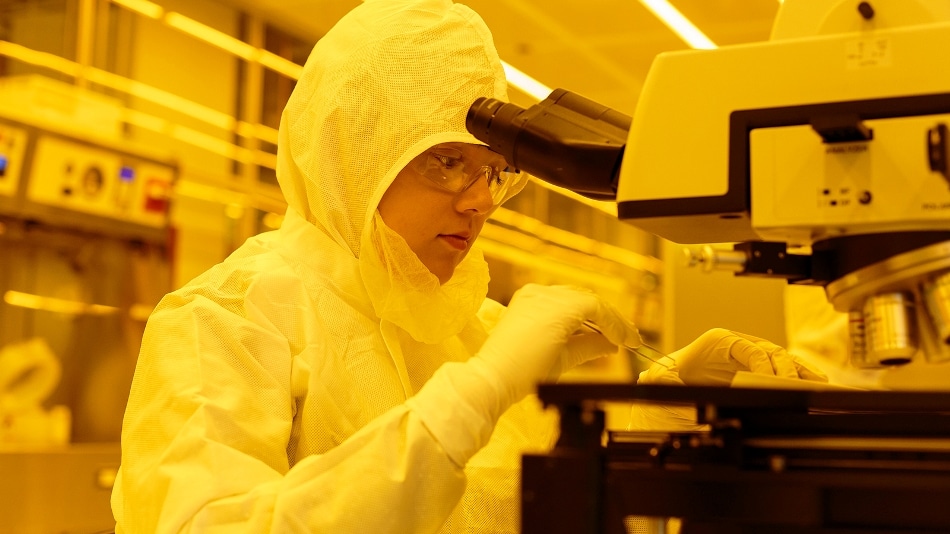Mar 6 2019
The University of Wisconsin-Madison (UW-Madison) has become the latest member of the Chicago Quantum Exchange—an emerging hub dedicated to the research and development of quantum technology.
 Abigail Shearrow, Research Engineer in the Schuster Lab at the University of Chicago, works in the Pritzker Nanofabrication Facility in the basement of the University’s William Eckhardt Research Center. (Image credit: University of Chicago, John Zich.)
Abigail Shearrow, Research Engineer in the Schuster Lab at the University of Chicago, works in the Pritzker Nanofabrication Facility in the basement of the University’s William Eckhardt Research Center. (Image credit: University of Chicago, John Zich.)
UW-Madison is collaborating with the U.S. Department of Energy’s (DOE) Fermi National Accelerator Laboratory and Argonne National Laboratory, the University of Chicago, and the University of Illinois at Urbana-Champaign to foster a national leading partnership in quantum information, which is a rapidly developing field.
The new collaboration comes after UW-Madison’s extensive investments in quantum science, a field that has the ability to transform security, communication¸ computing, etc. utilizing quantum mechanics’ robust capabilities.
Quantum technologies have attracted a great deal of attention in the federal government, who introduced the National Quantum Initiative late last year. The initiative approved an investment of over $1.2 billion in quantum studies over the next 10 years.
I think quantum science is one of the most exciting areas in physics right now. Joining the Chicago Quantum Exchange is going to put us in a very strong position in the landscape of academic institutions that are developing quantum technologies throughout the United States.
Robert McDermott, Professor, Department of Physics, University of Wisconsin
The objective of Chicago Quantum Exchange is to advance academic, governmental, and industrial efforts in the science and engineering of quantum information, with the aim to apply research breakthroughs to create dramatically new kinds of computing techniques, materials, and devices.
Bringing UW-Madison’s expertise in qubits and quantum information to the Chicago Quantum Exchange allows us to strengthen one of the largest quantum research efforts in the U.S. and will help us accelerate scientific developments that can lead toward promising new technologies.
David Awschalom, Director, Chicago Quantum Exchange
Awschalom is also a senior scientist at Argonne National Laboratory and Liew Family Professor in Molecular Engineering at UChicago.
The sustained growth of Chicago Quantum Exchange improves the position of the Midwest and the Chicago area to attract government funding and industry partnerships, while making it a frontrunner in training the novel quantum workforce.
Qubits are the fundamental units of quantum data rendered as an optical or electronic device. UW-Madison possesses institutional research know-how in three areas of qubits, such as silicon quantum dot qubits, superconducting qubits, and neutral atom qubits—together with quantum sensing studies being carried out by faculty, which includes College of Engineering Assistant Professor Jennifer Choy as well as Assistant Professor of Physics Shimon Kolkowitz, and also condensed matter studies being carried out by Professors Robert Joynt and Maxim Vavilov in the Department of Physics, Senior Scientist Lara Faoro, and Associate Professor Alex Levchenko.
We are looking forward to joint research projects within the CQE, which will give our students experience to enhance their education at UW-Madison. That collaboration is really important these days because a lot of expertise is needed to attack quantum computing problems from many different directions.
Mark Eriksson, Professor, Department of Physics, University of Wisconsin
With the continued growth of the field of quantum information science, the demand for quantum engineers at universities and in government and industry will also grow. Through its member institutions, the Chicago Quantum Exchange provides both graduate and undergraduate students access to world-class research facilities and expertise in quantum science and engineering.
“Developing a next generation quantum workforce is a huge priority nationally and worldwide,” stated Eriksson. “We are training students to have this broad base of expertise that will equip them to make a high impact in this developing field of technology.”
Apart from offering an active PhD program, the Department of Physics of UW-Madison currently provides a master’s degree in quantum computing. Welcoming its first class in the fall of 2019 and as the first-ever program in the U.S., the quantum computing program will provide college students with a grounding in quantum computing and quantum information.
The Department of Physics of UW-Madison already shares strong relationships with tech giants like Intel, Microsoft, and Google, and these firms have hired a majority of the university’s next-generation physics graduates earlier.
“UW-Madison awarded its first Ph.D. in physics in 1899 and has strong tradition of research in physics and its sub fields.” stated Steve Ackerman, UW-Madison associate vice chancellor for research in the physical sciences. “And today, by the investments we are making in quantum science and technology, we are building on that tradition and leading the way in concepts and technology that may revolutionize computing, communication, security and more.”